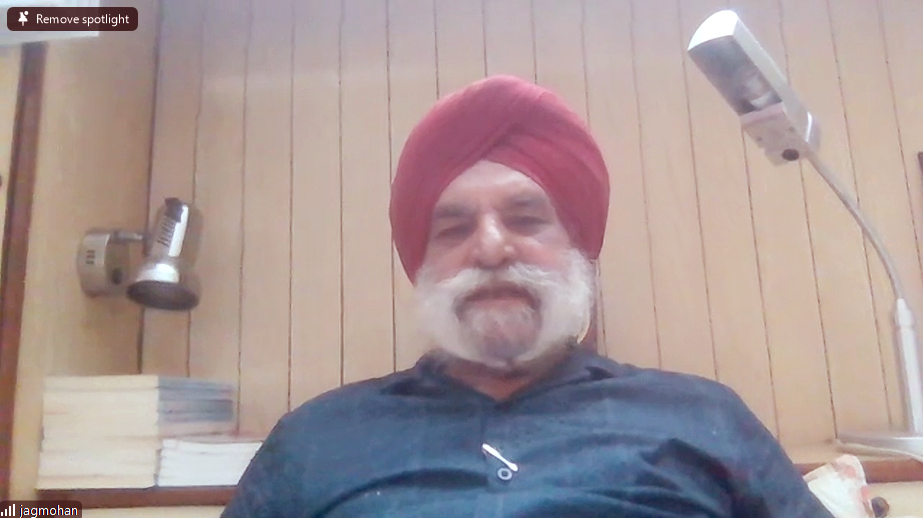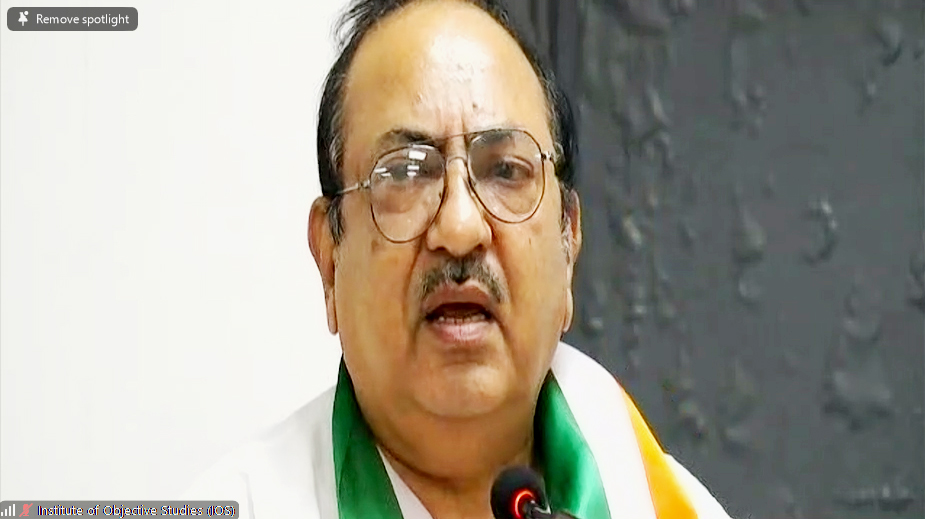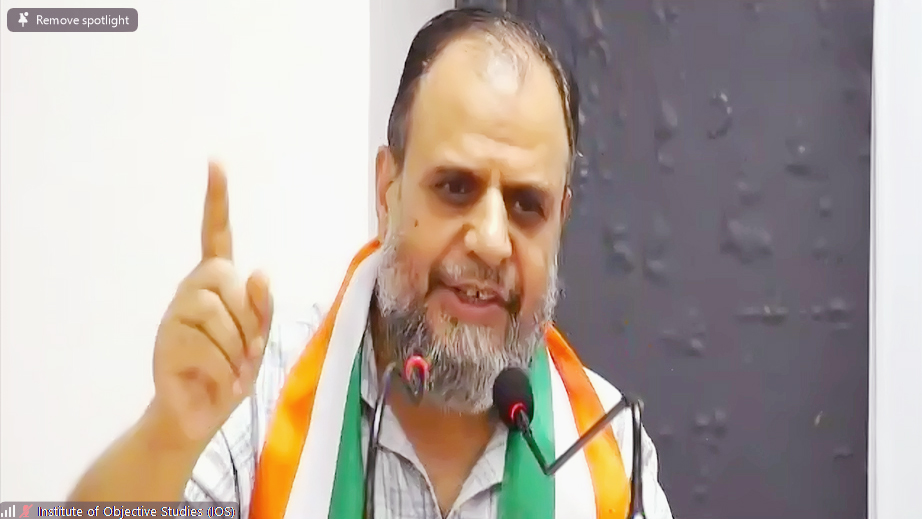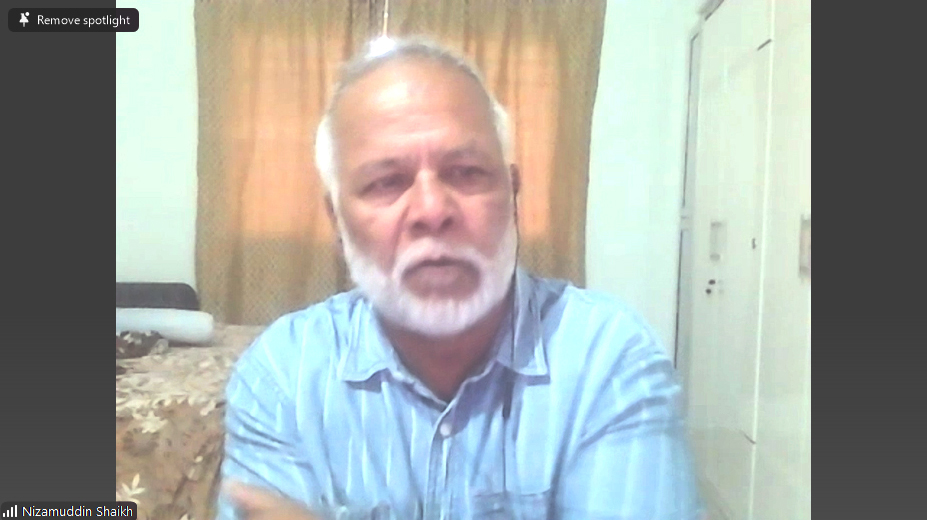IOS-AIMC jointly organise a Panel Discussion on “Freedom Fundamental to Building a Just Social Order”

IOS-AIMC jointly organise a Panel Discussion on “Freedom Fundamental to Building a Just Social Order”
New Delhi: A Panel Discussion on “Freedom Fundamental to Building a Just Social Order” was jointly organised by the Institute of Objective Studies (IOS) and All India Milli Council (AIMC) in hybrid mode on August 11, 2025, to mark the 79th Independence Day.
The discussion began with the recitation of a verse from Holy Qur’an by Mufti Mohammad Jamaluddin Qasmi from the Bihar unit of AIMC.

Maulana Shah Ajmal Farooq Nadwi, in-charge of Urdu section, IOS briefly spoke about the activities of both the organisations. He said that both IOS and AIMC were engaged in the activities for well-being of the country including the Muslims. Both of them celebrated national festivals in a spirit of patriotism and as a sense of national duty, he said.

Participating in the discussion, the great-grandson of Mahatma Gandhi, Mr. Tushar Gandhi, observed that this day assumed special importance for the countrymen. It was unfortunate that Bapu’s dream of complete freedom could not be realised. Complete independence corresponded to ‘Purna Swaraj’, and that was yet to be achieved. Gandhiji had asked the ministers of the interim government to work for achieving the goal of Purna Swaraj (complete self-governance). He had also asked them to uplift the socially weaker people and bring about a change in their life.
Mr. Tushar Gandhi questioned if those living in abject poverty and were unlettered, and subjected to injustice, had been lifted up. If such people admitted this fact, it meant that independence was incomplete. He called for understanding the true meaning of independence. He felt that the existing system of governance could not empower the people. “When the British Raj ruled us, we were their subjects. But, after attaining independence, we are free. However, we can do nothing with our free will because restrictions are being imposed on us. Our fundamental rights are being violated. We must think about the steps to be taken when we feel our independence is in danger.”
Mr. Tushar Gandhi held, “Some years ago, our freedom was endangered, but that phase also passed”. Again, he said, “Attempts are being made to bypass the Constitution and take decisions that do not conform to constitutional provisions”. In this connection, he cited the instances of Muslim baiting and anti-farmer policies. Constitution was being flagrantly violated by resorting to back door tactics. He minced no words in saying that injustice was being done to Muslims. He called for adopting a hard posture against the government if it posed a threat to the civil rights. But this needed unity as was demonstrated during the freedom movement. He recalled that Gandhiji had asked Lokmanya Tilak to strengthen Hindu-Muslim unity. This unity led to the ouster of Britishers from India. Keeping Hindu-Muslim unity in view, Gandhiji supported the Khilafat Movement. He called for unitedly working against injustice. A party which opposed the freedom movement was creating fear among Muslims. “Independence meant working for all and ensuring the well-being of weaker sections”. He held that criticism of government and its policies did not amount to sedition. Today, question mark was being raised against our Independence. Thus, it was a high time to unitedly fight against this tendency and save our democracy. He asked the countrymen to raise their voice against injustice on themselves and on others.

Maternal nephew of Shaheed Bhagat Singh and the Director of Shaheed Bhagat Singh Centre for Freedom Studies, Prof. Jagmohan Singh, said that the countrymen should work like their predecessors who formed interim governments in Bengal, Maharashtra and several other parts of the country during the British Raj, and gave a glimpse of how the independent India would be like. He held that they would have to work on the idea of Gram Swaraj which our national leaders adopted. Bhagat Singh penned his autobiography in his death cell. He wrote, “The firmness and steadfastness with which our brother, Ashfaq Ullah Khan stood with us, shows India is united for the freedom struggle.” In that book, he also wrote that the freedom fighters should be remembered simultaneously. He further noted that the same unity was displayed in Jallianwala Bagh. This unity led to General Dyer being declared insane. He warned that forces of doom were raising their ugly head once again and treading the same path of colonialism as the Britishers did. He called for confronting challenges with the power of education. The scourge of illiteracy and injustice could be removed by broadening the scope of social justice, he added.

Grandson of the equally great martyr, Amar Shaheed Ashfaq Ullah Khan, Ashfaq Ullah Khan, observed that his grandfather and other revolutionaries like him dreamed of an India where there would be social justice, brotherhood, peace, equality and happiness. He said that four convicts were hanged in 1925 in Kakori Case. They laid their lives at the altar of freedom. Ram Prasad ‘Bismil’ and Ashfaq Ullah Khan represented the legacy of composite culture, and strove for religious tolerance. They wanted that everyone should enjoy social justice and equal rights. He recalled that six months before his execution, Ashfaq Ullah Khan wrote a letter to his mother, and in reply to the letter, she said that her son belonged to Allah. He used to ask for working for brotherhood and communal amity. He was a symbol of patriotism. “The freedom which we got should be endured by way of strengthening religious bonds. We can keep alive this supreme sacrifice by ensuring social freedom”, he emphasised.

Professor of Medieval History, Aligarh Muslim University, Prof. M. Waseem Raja, held that currently, the country was passing through a critical phase of history in which individual freedom faced many challenges. Shaheed Bhagat Singh was worthy of emulation by the younger generation. Independence was not only a political inspiration, but it also focused on justice, peace and stability. He further said that from 70 to 80 per cent population of the country was deprived of independence because their aspirations had not been fulfilled. There was a time when the country used to produce world-class leaders but, today, they had been reduced to being leaders merely of their communities and groups. Today, no leader worth the name was in sight who could lead the nation and all the communities irrespective of their caste, creed and religion, he added.

Chief of the Delhi unit of the All India Milli Council, Haji Pervez Miyan, said, “Today, we are taking a fresh breath in Independent India due to the sacrifices made by our freedom fighters. We are remembering them for their dedication and commitment to free India from the foreign yoke. He recalled the statement of Shaheed Ashfaq Ullah Khan’s father who said that if he had six children, he would have sent all of them to die fighting against Britishers. He also remembered the Ulema who were hanged by the British Government for taking part in the freedom struggle. He said, “We cannot keep silent over the excesses being committed on the weaker sections.”

Acting President of the All India Milli Council, Maulana Anisur Rahman Qasmi, held that the injustice, tyranny and oppression done by the British government was being replicated even today. The equality given to all citizens was denied by the powers-that-be. Places of worship belonging to one particular community, were being vandalised or rased to ground. People who raised their voice against injustice were being incarcerated as was done during the British period. He laid the stress on keeping the spirit of Independence alive by sending out its message to the young generation. We need to think if those who are holding high offices after taking the oath of the Constitution are acting in accordance with the oath they had taken. He urged to work for preserving the Constitution.

In his presidential remarks, the Chairman of the IOS, Prof. M. Afzal Wani, pointed out that the first priority after the attainment of Independence was to create a just society. He opined that these values changed with the globalisation. Values changed but they required intellectual indulgence. The first war of independence in 1857 shook the colonial powers. Perpetual engagement of other people was necessary. India’s political freedom was a watershed in her history. After Independence, a judicious system of governance had to be put in place. About 200 people gathered and debated close to three years to prepare a document for independent India. A document came out with the mention of the term “We”. We, the people, had a social relationship. He called those traitors who refused to accept this. Everything was futile if challenges were not identified. Mohammad Baqir was shot by cannon for taking part in the freedom struggle. He said that the world was not so naïve as to accept everything one stated. The world was much diversified with different trades in existence. The programmes being organised by the IOS reflected the thinking that no judicious society could be made without a thought process.
Prof. Wani observed that in order to make a just society, an intellectual mindset had to be developed so as to understand why the gloom prevailed after independence. UNO was established, but Muslims never thought of their place in the scheme of things. He said that a just society should be based on justice, equality and liberty. He called upon the religious leaders to extract noble things from the scriptures and come out with the ideas that could help create a society based on justice. No idea against the spirit of the Constitution was acceptable. He said that 17 goals of sustainable development had to be met by 2030. But the question was if they would be achieved by the set time-frame. “We must introspect how far the Constitution was put into practice. Thought should also be given to the rate of success of the efforts to make a just society. These issues, he said, would be discussed in next programmes of the Institute. A big responsibility devolved on the Muslim community because the Prophet (PBUH) did it 1400 years ago, he concluded.

At the end, Sheikh Nizamuddin, Assistant Secretary General of the AIMC extended a vote of thanks to the speakers and the audience.
Go Back